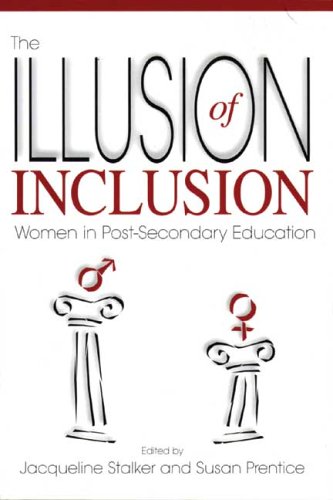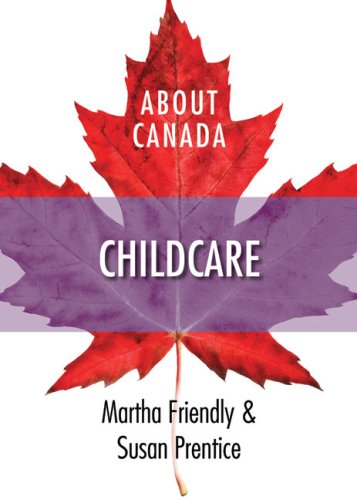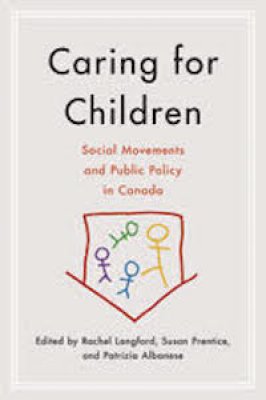
Media
Fernwood Publishing Co., Ltd.
1895686172
Both as students and as faculty, women continue to be discriminated against on Canadian campuses in ways ranging from the most systemic and institutional to the most interpersonal and subjective. Contributors to this anthology explore the contradiction between the widespread belief that women and men share equal educational opportunities and the uncomfortable reality of women’s marginalization and minority status.
Answering frequently asked questions about Early Childhood Education and Childcare (ECEC) in Canada, this accessible investigation seeks to establish proper standards for childcare programs, kindergartens, and nursery schools, thereby supporting the development of youth and accommodating parents who work or study. Questions covered include Why doesn’t Canada have an ECEC system, even though other countries do? What is missing in Canada’s ECEC landscape and why? and Is ECEC primarily a public good, a private family responsibility, or an opportunity for profit-making? Identifying this system as a political issue, this argument proposes that Canada requires an integrated system of services, stating that the absence of universal public funding is detrimental to the future of the country’s families, women, and children. Additional topics discussed include an analysis of the history of ECEC, politics and policies, and suggested improvements for the future.
Upstream Policy Change: Childcare Commission Lessons from Canada
Published by ACEL: Journal of the Australian Council for Educational Leaders
2016 In their day-to-day interactions with children, childcare leaders naturally focus on the local scale. Every day, in programs and in front-line settings, it seems to make the most sense to centre on children’s immediate needs. Sometimes, however, our reflex to focus on the local scale and immediate needs doesn’t lead to best outcomes.
There’s No Need to Fear a National Child Care Program.
Published by Globe and Mail
2013 Parents desperate for a childcare space; sky-high fees; sometimes dangerous unlicensed arrangements; limited accountability – The Globe and Mail’s comprehensive Daycare Project sketched a bleak picture for families across Canada. It highlighted initiatives making a difference in two provinces; Quebec’s ambitious but still uneven work-in-progress and PEI’s more modest steps towards public management. The series reinforced the urgent need for high quality childcare experienced by families everywhere in Canada and underscored its benefits for families, children and the economy. The painfully obvious conclusion is that we need a national childcare program.
The Conceptual Politics of Chilly Climate Controversies
Published by Gender and Education
2010 Across Canadian campuses, ‘chilly climate’ reports are produced by feminists and other equity-seekers, and are opposed by those who dispute both the diagnosis and the prescription for action contained in them. This article explores the conceptual debate which underlies chilly climate clashes, examining the contested meaning and practice of equality, responsibility, and the proving and remedying of discrimination. An analysis of the discursive debate reveals much about the social organisation of inequality within the academy and the challenges which face equity-seekers.
URL: http://www.tandfonline.com/doi/abs/10.1080/09540250050010009
Rural Childcare in Manitoba: New Economic Evidence
Published by Manitoba Leader – Association of Manitoba Municipalities
2008 In 2007, researchers "followed the money" to analyze the impact of childcare in Thompson, southwestern Parkland and in St-Pierre-Jolys. It was found that childcare is both an industry in its own right, as well as being an infrastructure that enables other sectors of the rural economy to function. The economic approach used complements long-standing evidence that confirms the value of childcare on children's development.
Less Access, Worse Quality
Published by Journal of Children and Poverty
2007 High-quality child care is a boon for children and buffers some of the long-term negative effects of growing up in straitened circumstances. Yet, just one in seven Canadian children has access to regulated care. Within this, poor children have worse access and are over-represented in lower-quality care arrangements. Canada's policy architecture, as reviews of Winnipeg, Quebec, and Vancouver demonstrate, generates inequities of access and quality that reproduce neighborhood socioeconomic gradients of class and racialization. Poor children are systematically disadvantaged by a national approach that relies on privatized partnerships with the voluntary sector to implement public child care policy. Equalizing poor children's access to quality child care remains a pressing Canadian challenge, and will require policy and delivery redesign.
URL: http://www.tandfonline.com/doi/abs/10.1080/10796120601171328
High Stakes: The “Investable” Child and the Economic Reframing of Childcare
Published by Signs: Journal of Women in Culture and Society
2009 The meaning of childcare services has long been contested. It has been breaktakingly malleable- from a nineteenth-century stigmatized welfare service to twentieth-century workfare, from children's gardens to centers for "eight-hour orphans", alternatively custodial or educational...
URL: http://www.journals.uchicago.edu/doi/abs/10.1086/593711?journalCode=signs
Early Childhood Education and Care Reform in Canadian Provinces: Understanding the Role of Experts and Evidence in Policy Change
Published by Edmonton Regional Group of the Institute of Public Administration Canada (IPAC) – IPAC Impact blog
2016 Currently, BC, Ontario, Quebec, Nova Scotia, New Brunswick, and PEI fund and deliver full-day kindergarten (FDK) through public schools, and other jurisdictions are considering or are in the process of adopting the policy. FDK is presented as a way to support children’s early years in a context of the changing family.
URL: http://ipacimpact.blogspot.ca/2016/04/early-childhood-education-and-care.html
Childcare, co-production and the third sector in Canada
Published by Public Management Review
2006 This paper reviews Canada's market-based childcare 'system' and considers its capacity to deliver universal services. Canada mainly relies on parent-controlled centres for delivery, in the near absence of publicly-provided services. Canadian childcare is characterized by frustrated national and provincial policy capacity, a high degree of commercial childcare, inequities in service distribution, and the burdening of parent-users (particularly mothers). This form of co-production poses considerable problems for the federal government, which has recently declared its intention to build a national system of early learning and care. The policy architecture makes a national system of early learning and childcare structurally unobtainable. This gap between political vision and local feasibility is explained through an analysis of service delivery, management and policy development. The paper concludes that co-production must shift if Canada is to implement a universal early learning and childcare program, but warns such change does not appear to be forthcoming.
URL: http://www.tandfonline.com/doi/abs/10.1080/14719030601022890
Beyond Baby Steps: Planning for a National Childcare System
Published by Policy Options
2016 Justin Trudeau’s government has made big promises to Canadian families. In the federal budget of 2016, it declared that “high-quality, affordable child care is more than a convenience—it’s a necessity.” The government will be taking action, as the Minister of Families, Children and Social Development and the Minister of Indigenous and Northern Affairs develop agreements with provinces, territories and Indigenous communities to fulfill election commitments on child care.
Biography
Susan Prentice's research program begins with social inequality, social change, public policy, and systemic discrimination. She works in two broad areas of scholarship, with a critical focus on gender relations. She is trained as a historical sociologist and brings a historical and sociological imagination to her work. Prentice's primary specialization is contemporary and historical childcare policy and advocacy. Childcare provides a window into state-society relations at the exact moment where gender, family, work, social policy, market forces/privatization, and social movement organizing intersect. Her secondary arena of specialization is higher education, exploring how formally neutral institutions co-exists with inequality and marginalization. Prentice's research program has recently turned to European policy debates and social movement struggles to promote and defend work-family reconciliation in hard economic times. She practices public sociology and works closely with social movements. She actively works on knowledge mobilization oriented to popular audiences, social movements, elected officials, decision makers, and the media. Her undergraduate teaching includes Introduction to Sociology (SOC 1200), the undergraduate Honours Seminar Critical Issues (SOC 2010), Family (SOC 2460), and the Honours Seminar (SOC 4450). Her graduate teaching has recently focused on public sociology. Prentice has worked with MA and PhD students in Anthropology, Applied Health Sciences, City Planning, Computer Science, Economics, Education, English, Family Social Studies, History, Individualized Inter-disciplinary Studies, Political Studies, Rural Studies and Social Work, as well as Sociology.
Additional Titles and Affiliations
Manitoba Commission on Early Learning and Childcare : Member
International Centre for the Mixed Economy of Childcare (ICMEC) University of East London : Advisory Board
Child Care Coalition of Manitoba : Member
Coalition Francophone de la Petite Enfance du Manitoba : Table de Recherche
Past Talks
Leading Childcare Policy Change: Lessons from Canada
Early Childhood Conference: Leading in the Early Years in a New Era, organized by the Australian Council of Educational Leaders
Brisbane, Australia, July 1, 2016
Les service de gardes et l’éducation post-secondaire
Association francophone pour le savoir (ACFAS) – Manitoba. Keynote address to Journée du savoir
l’Université de Saint-Boniface, MB., April 1, 2016
Research Grants
Investigating Professionalism as a Canadian Child Care Movement Strategy in an Era of Neoliberalism
Organization: SSHRCDetails:
A 2011 – 2015 project, funded by SSHRC, with Rachel Langford (PI, Ryerson) and Patrizia Albanese (Ryerson.)
Early Childhood Education and Care In Canada: Knowledge Transfer and Mobilization
Organization: SSHRC Connections GrantDetails:
This one-year project was a collaboration with Donna Lero (University of Guelph) and Martha Friendly (Childcare Resource and Research Unit).
FemNorthNet: Learning From Women's Experiences Of Community Transformations as a Result of Economic Restructuring
Organization: SSHRC Northern Communities CURA projectDetails:
A five-year (2010 - 2015) SSHRC Northern Communities CURA project. Jane Stinson, of the Canadian Research Institute for the Advancement of Women, led the large research team of community and university-based researchers. I worked with the Thompson community team as the academic coordinator and I co-led the social infrastructure research theme with Teresa Healy.
Advancing Work-Family Reconciliation: Framing Gender And Generational Justice Across Canadian and European Social Movements and Policy
Organization: SSHRCDetails:
This project, on which on which I was principal investigator ended in 2015 and was funded by SSHRC.
Caring about Care: An Examination of Care in Canadian Childcare
Organization: SSHRC Insight GrantGrant amount: 127521
Details:
2016 - 2019 This project is led by Rachel Langford (Ryerson University) and includes Patrizia Albanese (Ryerson University) and Kate Bezanson (Brock University), building on our previously SSHRC-funded work on childcare and social movement organizing.







